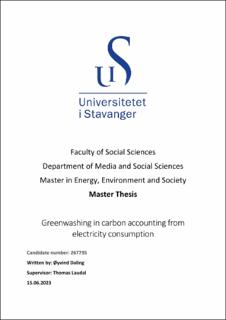| dc.contributor.advisor | Laudal, Thomas | |
| dc.contributor.author | Daling, Øyvind | |
| dc.date.accessioned | 2023-09-26T15:51:19Z | |
| dc.date.available | 2023-09-26T15:51:19Z | |
| dc.date.issued | 2023 | |
| dc.identifier | no.uis:inspera:153029635:97014212 | |
| dc.identifier.uri | https://hdl.handle.net/11250/3092129 | |
| dc.description.abstract | The necessary actions to fight climate change is becoming more and more urgent year by year. To reach the ambitions set in the Paris Agreement, all stones must be turned. The GHG Protocol is the most recognized framework for businesses to account for their emissions use a methodology for calculating emissions from electricity that are questioned by some scholars. The “market-based methods” and the dual reporting from the GHG Protocol give room for companies to use fossil fuels, and still report lower emissions than what they can with electricity. Purchases of contractual emission factors like a Guarantee of Origin even further contribute to the possibility of companies greenwashing their business. In this study the framework is examined through a literature review and case research from the Norwegian company Skretting. The results clearly point towards the need for a new methodology and suggest that more companies that consume high levels of energy are implemented in the EU Emission Trading System. | |
| dc.description.abstract | The necessary actions to fight climate change is becoming more and more urgent year by year. To reach the ambitions set in the Paris Agreement, all stones must be turned. The GHG Protocol is the most recognized framework for businesses to account for their emissions use a methodology for calculating emissions from electricity that are questioned by some scholars. The “market-based methods” and the dual reporting from the GHG Protocol give room for companies to use fossil fuels, and still report lower emissions than what they can with electricity. Purchases of contractual emission factors like a Guarantee of Origin even further contribute to the possibility of companies greenwashing their business. In this study the framework is examined through a literature review and case research from the Norwegian company Skretting. The results clearly point towards the need for a new methodology and suggest that more companies that consume high levels of energy are implemented in the EU Emission Trading System. | |
| dc.language | eng | |
| dc.publisher | uis | |
| dc.title | Greenwashing in carbon accounting from electricity | |
| dc.type | Master thesis | |
